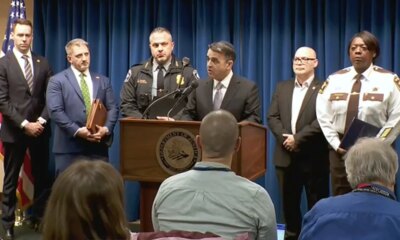Connecticut
Sleepy Connecticut town rocked by alleged drug-dealing pastor

A wholly unholy situation
Forget sniffing pot around New York’s cathedrals. Nearby, in uppity Connecticut, exists a Methodist church where it’s shove the donations and stuff the Hail Marys. Forget a buck in the basket. Its religious rev was allegedly hustling junk.
Earlier this month, this pastor got arrested. Age 63. The Rev. Herbert Irving Miller. Prayed there since July. Forget Matthew, Mark, Luke or John. Cleric Herbie was allegedly selling drugs. Crystal meth. Clientele called it speed or ice or dunk or no doze or white cross. I mean, talk of a happy Last Supper.
United Methodist Church hierarchy called it a shock to the community. Yeah, no kidding.
Undercover guys pulled him over on South Main Street. Per the report, they collared His Worship hustling the stuff from a car a pew away. Inside, drugs. Methamphetamine in rock and liquid form. Hypodermic needle.
The car? No registration. No insurance. Besides charged with possession and intent to sell drugs he illegally operated a motor vehicle. He’s been jailed. Released on $10,000 bond. This padre listed his address as the rectory. His court appearance is Friday. Herbie is no longer an elder in the United Methodist Church.
My friends live in Woodbury. I know this church. I know the town. Its main drag’s famous. A mile of well-known antique stores. Both sides of the street. Flea markets, open Saturdays, curbside sales, free parking, personal delivery, rent-a-space for $30.
In and out 24/7 it’s New York decorators, buyers, artists, designers, fashionistas, home-owners, collectors, specialists, strangers.
And until a few weeks ago, a minister allegedly hustling junk.
Wine, roses and O’Hara
MANHATTAN’s shining light is award winning Kelli O’Hara who, along with Brian d’Arcy James, is staging Studio 54’s “Days of Wine and Roses” musical.
Kelli: “I’m from where the Irish settled. Elk City. Western Oklahoma. We farmed cotton, wheat, cattle. Voice teacher Florence Birdwell changed my life. I had my dream. Two suitcases, no clue or job. After college I moved to New York.”
After roles in “The Pajama Game,” “The King and I,” “South Pacific,” etc., she ever screw up?
“Please. Nightmares. Times you can’t remember your name. You scramble. One show I shortened by cutting out a whole scene. Metropolitan Opera, center stage, I went blank and had to walk off into the wings until the line got whispered to me.
“Look, I try to rest. Drink water. Don’t smoke. Exercise. Don’t drink lots of alcohol. Stretch my body. I have two children — 10 and 14. If they’re sick I can’t not talk to them because I can’t not be their mom since my need is to have a perfect show. I cannot worry about that. Sometimes I wear a mask but I don’t want to get neurotic.”
Kelly and I share Dan Lipton. Her accompanist. My friend.
On the town
VIPs all around the town. Is a 17th congressional run left in the tank for Carolyn Maloney? She just celebrated a burger birthday at UES’s Beach Cafe . . . HUMA Abedin shopping alone. Buying pasta and beans. No weiners (she divorced that live one) in her cart.
NEW Yorkers really don’t like to miss anything. After the Bible Society listed 143 officially recognized sins, nearby parishioners have been pouring in — all of them asking for a copy of the complete list.
Not only in the Northeast, kids, not only in the Northeast.

Connecticut
Lawmakers again push to restore Shore Line East service to 2019 levels

Connecticut lawmakers are again looking to restore Shore Line East rail service to its pre‑pandemic levels, a proposal that could add about 90 more trains per week.
Lawmakers are also weighing a separate cost‑saving proposal to shift the line from electric rail cars back to diesel.
The plan comes as ridership remains well below 2019 numbers, though state data shows those numbers have begun to climb.
The Department of Transportation provided the General Assembly’s transportation committee with the following data:
- 132 trains per week today versus 222 trains per week in 2019, according to the CTDOT commissioner.
- In 2019, most weekday SLE trains traveled between New Haven Union Station and Old Saybrook. This allowed SLE to operate with only five train sets in the morning and four train sets in the afternoon.
- It should be noted that 2019 SLE service levels were very different due to constrained infrastructure; 2019 service levels had a reduced number of SLE trains serving New London (13 trains per day Monday through Friday, as opposed to 20 today), while other stations had increased service (36 trains per day Monday through Friday, as opposed to 20 today).
“2019 levels beyond Old Saybrook to New London would require more crews and more train sets than were used in 2019, requiring significantly more financial resources,” the department wrote in its written testimony.
The department said the governor’s FY2027 budget does not include funding for a full restoration. In other words, even if the legislature requires additional trains, the funds are not included in the current financial plan.
Governor Lamont said on Monday to remember that the state subsidizes the line more than any other rail right now.
“There’s not as much demand as there are for some of the other rail services in other parts of the state, so that’s the balance we’re trying to get right,” Lamont said.
At a public hearing on Monday, concerns about the line’s reliability and schedule were a central focus in the testimony.
“We’re making the line less attractive, some would say. The schedules are very, very difficult to manage,” said Sen. Christine Cohen of Guilford, the co-chair of the committee.
The current schedule for eastbound morning commuters is difficult. The train either arrives in New London just after 7 a.m. or after 9 a.m.
“So obviously not really … conducive to a typical workday,” Cohen said.
Cohen, who represents communities along the line, said she continues to reintroduce the bill to expand service year after year, pushing the state to do more with the line.
She thanked the department for the work it was able to do with the recent funding to establish a through train to Stamford.
“What do we need to do, and what are the challenges that you face in terms of expansion at this time?” Cohen asked.
Commissioner Garrett Eucalitto responded that the biggest hurdle is the cost of labor and access fees to Amtrak, which owns the territory.
“The cost to provide rail service is very expensive,” Eucalitto said.
He said CTDOT knows the current schedule is “not ideal,” but the economics of a work-from-home society are difficult.
“People expect 100% of the trains that they had in 2019, but they only want to take it two days a week,” Eucalitto said.
Asked about the eastbound schedule, the commissioner explained Shore Line East still operates on a model that sends trains toward New Haven in the morning rather than toward New London.
Changing that would require more equipment, more crews, and a second morning operations base, as well as negotiations with Amtrak, which owns the tracks.
Amtrak is “protecting their slots to be able to run increased Northeast Regional service as well as increased Acela service,” Eucallito said. “They’re going to look at us and question, ‘Well, how does that impact our need for Amtrak services?’ They’ll never give you an answer upfront, it’s always: ‘show us a proposal and then they’ll respond to it.’”
Cohen, who chairs the Transportation Committee, touted how a successful Shoreline East benefits the environment, development along the line, and reduces I-95 congestion.
“We need to start talking about how much money this costs us and think about all of the ancillary benefits,” Cohen said during the hearing.
Cohen said there is multi-state support for extending the line into Rhode Island.
“We will need some federal dollars. But as you say, there are other businesses up the line in New London,” Cohen said. “We’ve got Electric Boat. We’ve got Pfizer up that way. If we can get those employees on the transit line, we’re all the better for it.”
Rider advocates said the issue is familiar.
“I’d rather see solutions, and not things that are holding it back,” said Susan Feaster, founder of the Shore Line East Riders’ Advocacy Group.
She said she worries the line is facing a transit death spiral, with reduced service leading to lower ridership and falling fare revenue.
“They have to give us the money,” Feaster said. “It shouldn’t have to be profitable.”
Like other train lines across the country, Shore Line East relies on subsidies.
“We’re not asking for everything to be done overnight, but just incrementally,” Feaster said.
The line received $5 million two years ago, which increased service levels.
The proposal comes as the state reviews whether to return to diesel rail cars that are more than 30 years old.
The state says the switch would save about $9 million, but riders have said it would worsen the passenger experience.
NBC Connecticut asked Cohen whether she’ll ask DOT to reverse that proposal.
“I really want to,” Cohen said. “I appreciate what CTDOT was trying to do in terms of not cutting service as a result of trying to find savings elsewhere. This isn’t the way to do it.”
Connecticut
Iranian Yale scholar in Connecticut celebrates fall of regime, calls for free elections

HARTFORD, Conn. (WFSB) – Thousands of Connecticut families with ties to Iran are watching and waiting as their home country undergoes a historic change.
Among them is Ramin Ahmadi, a Yale doctor, human rights activist and founder of the Iran Human Rights Documentation Center. He has spent decades advocating for freedom in Iran from his home in Connecticut.
Ahmadi moved to the United States when he was 18. On Saturday morning, he learned of military strikes in Iran and the death of the country’s supreme leader.
Ahmadi said protests for democracy and human rights in Iran intensified in December, drawing millions of participants — including his own family and friends.
“The situation in Iran was a humanitarian emergency and it needed an intervention,” Ahmadi said.
He said he celebrated when he heard the news Saturday morning.
“I was celebrating along with all other Iranians inside and outside the country,” Ahmadi said. “I do regret that we cannot bring him to a trial for crimes that he has committed against humanity.”
Ahmadi said he spoke with his sister in Iran after she celebrated in the streets. She was later told to return home for her safety.
He shared a message she relayed from those around her.
“They said do not let our death be exploited because worse than that is having to live with the criminals who have done this to us for the rest of our lives,” Ahmadi said. “We do not want to do that.”
For those questioning whether the conflict was America’s to engage in, Ahmadi offered a direct response.
“We will all be affected,” he said. “And to those that tell you that the U.S. and Israel are beating the drums of war in Iran, one has to remind them that it was not like before this Iranian people were listening to Beethoven’s Symphony No. 9 in D minor. We had a war already declared on us by this regime. We were being slaughtered on a daily basis.”
Ahmadi said he believes the path forward begins with young military officers forcing out what remains of the regime, followed by free elections.
“Everyone’s life will be safer in the future and not just Iranians,” Ahmadi said.
Connecticut lawmakers are also responding to the U.S. strikes on Iran.
Copyright 2026 WFSB. All rights reserved.
Connecticut
Two people shot in New Haven restaurant Saturday evening

New Haven police say two people were shot at a restaurant on Grand Avenue Saturday evening.
One of the victims was a 22-year-old male from East Haven who was shot in the leg and was transported to Yale New Haven Hospital for treatment.
According to police, the second victim was a 17-year-old male and arrived shortly after.
While on scene, police confirmed one of the possible shooters was still inside the restaurant.
According to police, the victims were both inside the restaurant when the teen was approached by Naguea Bratton and another suspect.
They say a fight occurred which resulted in both victims being shot.
Police detained Bratton who was charged with carrying a pistol without a permit, two counts of illegal possession of a high-capacity magazine and larceny of a motor vehicle.
Bratton is being held on a $200,000 bond.
Both victims have non-life-threatening injuries police say.
They say additional arrests are expected to be completed by warrant.
-

 World5 days ago
World5 days agoExclusive: DeepSeek withholds latest AI model from US chipmakers including Nvidia, sources say
-

 Massachusetts5 days ago
Massachusetts5 days agoMother and daughter injured in Taunton house explosion
-

 Denver, CO5 days ago
Denver, CO5 days ago10 acres charred, 5 injured in Thornton grass fire, evacuation orders lifted
-

 Louisiana1 week ago
Louisiana1 week agoWildfire near Gum Swamp Road in Livingston Parish now under control; more than 200 acres burned
-

 Technology1 week ago
Technology1 week agoYouTube TV billing scam emails are hitting inboxes
-

 Politics1 week ago
Politics1 week agoOpenAI didn’t contact police despite employees flagging mass shooter’s concerning chatbot interactions: REPORT
-

 Technology1 week ago
Technology1 week agoStellantis is in a crisis of its own making
-

 News1 week ago
News1 week agoWorld reacts as US top court limits Trump’s tariff powers























